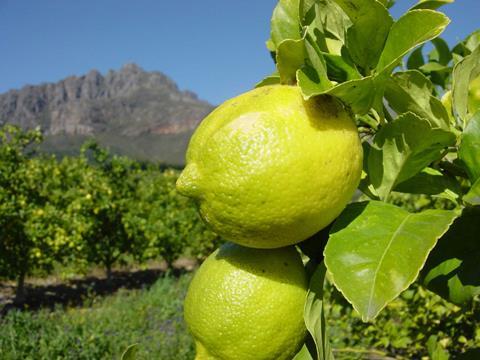
South African lemon and grapefruit growers have begun harvesting their 2014 new-season crop. Grapefruit growers are expecting a smaller crop, but with bigger sizes. Lemon growers believe they will have another good season, pointing to strong markets around the world.
“We had an on-season last year for grapefruit,” said Justin Chadwick of South Africa’s Citrus Growers Association (CGA). “This year the crop will be smaller, but the [quality] specification should be better.”
Hannes de Waal, marketing manager at SRCC, the country’s leading lemon packer, based in the Eastern Cape, says South Africa is expecting a good crop, with very bright marketing prospects. “Turkey and Argentina have had their problems and this is strengthening the market,” he noted.
Despite stating a firm desire to increase exports to Asia, de Waal said market development is a slow process. In particular, he said it it is difficult to ship lemons into a number of the region’s markets on account of their stringent quarantine regulations. “It’s hard to ship lemons under the present protocol to China, which requires a steri period of 24 days,” he observed. “The fruit suffers under this extended period [of cold treatment] at 0.5oC.”
De Waal is confident that South African authorities and their Chinese counterparts can find a solution to amend the protocol. “It is essentially there to prevent False Codling Moth to be transferred, but this is not really a problem for lemons. So we can do without this strict protocol on lemons.”
Weighing up the Black Spot impact
South African exporters don’t believe the present Citrus Black Spot (CBS) problems with the European Union will result in a rush of fruit to the Asian markets.
“It’s not easy to shift fruit destined for Europe to other markets,” added de Waal. “However, we are working very hard to develop markets outside Europe, while at the same time maintaining our position there.”
South African exporters may we find that climate will force their hand. Recent prolonged and heavy rain in the northern production regions are making life difficult for growers to effectively control CBS in the orchards and they may find it increasingly hard to avoid exceeding the interception limit if they send the current volumes to Europe. This will mean that out of necessity they may have to ship more fruit to markets outside the EU.
Concern over Russia
The distribution of South African grapefruit, in fact all citrus categories, may well also be affected by recent events in Russia and the Ukraine. The recent decline in the Russian currency following instability in the Crimean Peninsula is expected to affect the buying power of the Russian trade. This will make it difficult for Russian importers to match prices elsewhere, and could cause fruit to be diverted elsewhere.
The developments in Russia are seen by observers in the South African citrus sector as a major setback in efforts to expand this fairly rapidly growing market for South African fruit.
The grapefruit season will only really get underway in mid-April with the first fruit to Japan leaving towards the end of April. So far this season most lemons have been shipped to the Middle East where demand has been very good.



